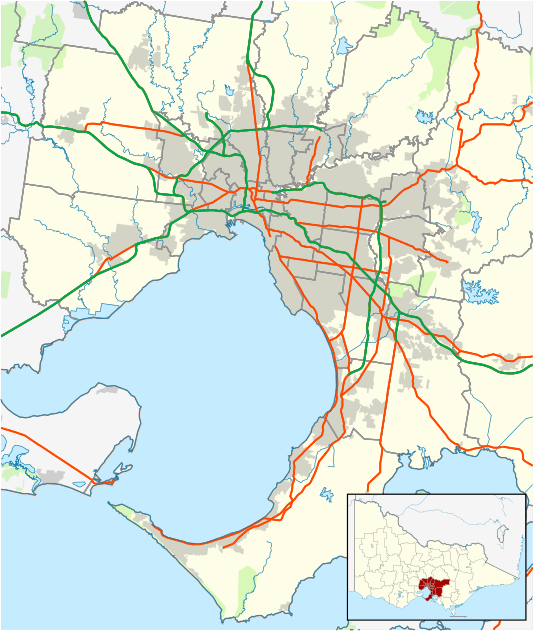Blackburn, Victoria
| Blackburn Melbourne, Victoria | |||||||||||||
|---|---|---|---|---|---|---|---|---|---|---|---|---|---|
|
| |||||||||||||
 Blackburn | |||||||||||||
| Coordinates | 37°49′34″S 145°09′04″E / 37.826°S 145.151°ECoordinates: 37°49′34″S 145°09′04″E / 37.826°S 145.151°E | ||||||||||||
| Population | 12,796 (2011)[1] | ||||||||||||
| • Density | 2,206/km2 (5,710/sq mi) | ||||||||||||
| Postcode(s) | 3130 | ||||||||||||
| Area | 5.8 km2 (2.2 sq mi) | ||||||||||||
| Location | 17 km (11 mi) from Melbourne | ||||||||||||
| LGA(s) | City of Whitehorse | ||||||||||||
| State electorate(s) | Box Hill | ||||||||||||
| Federal Division(s) | Deakin | ||||||||||||
| |||||||||||||
Blackburn is a suburb of Melbourne, Victoria, Australia, 17 kilometres (11 mi) east of Melbourne's Central Business District.[2] Its local government area is the City of Whitehorse. At the 2011 Census, Blackburn had a population of 12,796.
The origin of the name Blackburn is not certain, but may have been after an early settler or James Blackburn, who designed Yan Yean Reservoir. It lies within the City of Whitehorse, in Melbourne's eastern suburbs.
Blackburn is bounded in the west by Middleborough Road, in the north by Springfield Road, in the east by an irregular line along streets to the east of Blackburn Lake Sanctuary and in the south by Canterbury Road.
History
Europeans first settled the area of Blackburn in the 1840s. The area was densely wooded, though orchards and small farms were soon developed. In 1861 the Traveller's Rest Hotel was built on the current site of the Blackburn Hotel. Blackburn Creek Post Office opened on 10 January 1876 and was renamed Blackburn in 1883.[3]
During the land boom of the 1880s, brickworks and quarries were established in the area. Blackburn railway station was built in 1882. A primary school was established in 1889.
Though the area near the railway station was subdivided in the 19th Century, development was slow and most houses in the suburb were not built until after the Second World War.
A large part of Blackburn is of historical significance, as it was built around the artificial Blackburn Lake in 1889, now known as Blackburn Lake Sanctuary, with the lake in the middle of the sanctuary. This was a popular day trip destination by train in the late nineteenth century. Some Australian artists painted in the bush around the Blackburn and Box Hill areas. Of these, Roberts and McCubbin are the best known. The area is protected by strict planning controls restricting development and has retained a village atmosphere.
Facilities
The major shopping hub of Box Hill is two train stops away, while three buses connect Blackburn to Forest Hill. It shares its postcode with Blackburn North and Blackburn South.
Blackburn contains two railway stations, Laburnum and Blackburn, on the Belgrave and Lilydale lines, the former of which services the locality of Laburnum, in the western part of the suburb. Blackburn is home of the 1st/8th Blackburn Scout Group and The Nerve Centre.
Blackburn enjoys three significant bushland parks: the Blackburn Lake Sanctuary, the Blackburn Creeklands park (comprising Blacks Walk, Kalang Park and Furness Park) which follows Gardiners Creek, and Cootamundra Walk.
Sport
There are many sporting clubs for all ages:
- The suburb has an Australian Rules football team, The Blackburn Panthers' (known as 'The Burners'), competing in the Eastern Football League.[4]
- Cricket: Blackburn Cricket Club, Blackburn North Cricket Club, Blackburn South Cricket Club, Laburnum Cricket Club (formerly Nunawading Churches of Christ Cricket Club)
- Soccer: Blackburn Soccer Club, Blackburn North Baptist Soccer Club
- Netball (Juniors): Blackburn South Netball Club, St Thomas Netball Club, Laburnum Netball Club, Blackburn Burners Netball Club.
- Tennis: Blackburn Tennis Club
- Basketball: Blackburn Vikings - teams playing in the Victorian Junior Basketball League (Juniors) and the BigV Competition (Senior)
Local schools
There are five schools in Blackburn: Laburnum Primary School, Blackburn Primary School, Blackburn Lake Primary School, St Thomas the Apostle Primary School and Blackburn High School.
Notable residents
- Josh Gibson, footballer for the Hawthorn Hawks in the AFL. He grew up in Blackburn.[5]
See also
- City of Nunawading - A former Local Government Area which Blackburn was a part of.
- Laburnum, Victoria
References
- ↑ Australian Bureau of Statistics (31 October 2012). "Blackburn (State Suburb)". 2011 Census QuickStats. Retrieved 21 August 2012.
- ↑ http://www.postcodes-australia.com/areas/vic/ferntree+gully/blackburn
- ↑ Premier Postal History, Post Office List, retrieved 11 April 2008
- ↑ Full Point Footy, Eastern Football League, retrieved 21 October 2008
- ↑ Waiting game is over for Hawk
External links
| Wikimedia Commons has media related to Blackburn, Victoria. |